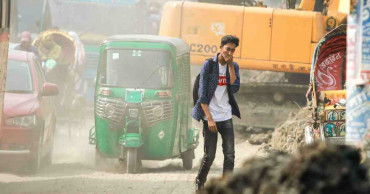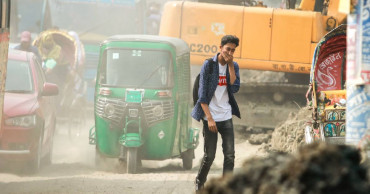Clean air
Voters prioritise clean air, safe water as parties focus on roads, bridges: CPD
A nationwide survey by Centre for Policy Dialogue (CPD) has found a significant gap between voters’ expectations and political parties’ priorities in building a green and sustainable society, even as environmental concerns increasingly shape public aspirations ahead of the national election.
The study titled ‘State of and Expectations on ‘Green and Sustainable Economy’ in Electoral Constituencies: Survey Findings on Voters and Candidates’ was released on Saturday. CPD Research Director Khondaker Golam Moazzem presented it at the BRAC Centre in the capital.
Conducted in 150 environmentally vulnerable constituencies, the study found that voters overwhelmingly prioritise cleaner air, safe drinking water and stronger environmental protection.
Political parties, however, continue to frame development largely around traditional infrastructure such as roads and bridges, paying limited attention to structural green reforms.
The findings are based on interviews with 1,200 voters and 450 political party representatives across all eight divisions, focusing on perceptions of environmental, economic and social dimensions of a green society.
According to the survey, environmental degradation is already a lived reality for voters in climate hotspot areas.
More than 73 percent of voters identified air pollution as a major problem, followed by flooding and cyclones.
In drought-prone Barind regions, 81 percent of voters reported rising temperatures, while 90 percent of voters in haor areas cited worsening air quality.
River erosion, groundwater depletion and frequent health problems were also reported widely, particularly in areas exposed to overlapping climate risks such as river systems combined with urban or coastal features.
Political party representatives broadly acknowledged these challenges, especially air pollution and health impacts.
But, sharp mismatches emerged in northern drought-prone areas, where only about one-third of party respondents recognised rising temperatures as a serious concern, despite overwhelming voter consensus.
Around 61 percent of voters consider environmental restoration to be highly important in their localities. Tree plantation and reducing plastic use were identified by both voters and party representatives as the main tools for restoration.
CPD researchers, however, noted a clear disconnect between diagnosed problems and proposed solutions. While air pollution and rising temperatures were identified as the most pressing issues, both voters and candidates showed limited emphasis on fossil fuel phase-out, emissions control or cleaner energy transitions.
The survey also revealed low confidence in environmental governance. More than 70 percent of voters said existing environmental laws and regulations are insufficient, while nearly two-thirds believe the government is not doing enough to protect the environment.
Political party respondents expressed similar dissatisfaction, pointing to weak enforcement and excessive centralisation.
Nearly half of voters described themselves as moderately aware of renewable energy, with awareness higher among younger age groups. Political party representatives showed comparable levels of awareness, particularly among major parties, and largely agreed that renewable energy is important for Bangladesh’s development.
Despite this, renewable energy was rarely linked to environmental restoration or green behaviour. Instead, voters and parties alike associated green behaviour mainly with tree planting, conserving water and electricity, and reducing plastic use.
When asked to choose between environmental protection and economic growth, more than 93 percent of voters said environmental protection should be prioritised. However, most were unwilling to place it above traditional infrastructure projects such as bridges and roads, a position mirrored by political parties.
While nearly 80 percent of voters said they prefer sustainable economic growth over traditional growth, their understanding of development remains heavily infrastructure-focused. More than three-quarters equated development with building roads and bridges, followed closely by employment generation.
Political parties showed slightly greater emphasis on human capital, identifying quality education and healthcare as key elements of sustainable growth. Voters, by contrast, placed stronger weight on poverty reduction and immediate economic relief.
Bangladesh edging towards ‘debt trap’, warns CPD’s Mustafizur Rahman
Both groups agreed that eco-friendly practices could reduce long-term costs, but were reluctant to absorb short-term increases in expenses associated with green transitions.
The social dimension of a green society emerged as the least developed in public perception. Voters identified poverty, low income and lack of education and skills as the main barriers to a green transition. Political parties, meanwhile, placed greater emphasis on people’s mindset and resistance to change.
Gender inequality was ranked as a relatively minor obstacle by both groups, a finding CPD described as concerning given the role of women’s participation in sustainable development.
Community engagement on environmental and social issues was reported as fragmented, with more than 60 percent of both voters and party representatives saying there are not enough awareness programmes at the local level.
Looking ahead, voters expressed clear aspirations for environmental improvement. About 61 percent said improving air quality should be the top priority, followed by ensuring clean drinking water. These preferences remained consistent across regions and age groups, suggesting a demand for basic environmental improvements rather than location-specific solutions.
Voters also expect Members of Parliament to lead environmental restoration through policy formulation, budget prioritisation and stronger monitoring and accountability.
On the economic front, investment in renewable energy emerged as the most frequently cited priority for the next government, alongside sustainable agriculture, job creation and SME development.
The CPD study concludes that although environmental awareness among voters is rising, electoral politics remains anchored in conventional development narratives.
The mismatch between voter aspirations and party priorities, particularly on clean energy, governance reform and social inclusion, risks weakening the credibility of green commitments in election manifestos.
The think tank recommended that political parties integrate clearer, cost and locally relevant green policies into their programmes, strengthen local government capacity and align development promises with the lived environmental realities of voters.
12 days ago
Dr Tasnim Jara urges MPs to lead fight for clean air as ‘it’s a right’
Shedding light on pathways to clean air and blue skies in the Hindu Kush Himalaya (HKH) region, National Citizen Party’s (NCP) first senior joint member secretary Dr Tasnim Jara on Tuesday emphasised that people must remain at the centre of climate and environmental action.
"It’s about our children breathing freely. It’s about them living longer, healthier, more fulfilling lives. If we connect to that human story, it binds us across political lines and across borders," she said while speaking at a high-level panel discussion on the sidelines of the HKH Parliamentarians’ Meet 2025.
A popular figure known for her evidence-based health videos with millions of followers, Dr Jara outlined four key steps to tackle air pollution - building a shared scientific foundation, harmonising policies, mobilising finance and keeping people at the centre.
UNDP launches ‘clean air’ campaign amid deteriorating air quality
She stressed the unique role of parliamentarians and said, "They are not just lawmakers. They are the bridge between science and people, between global commitments and local realities. That is why they must step forward and act.”
Dr Jara underlined that clean air is not a luxury, but a right.
Framing it as a political issue, she said, “If we can secure that commitment across the region, our partners will act together. The sky above belongs to all of us, and we must defend our right to clean air with urgency. We either fix this together, or we fail separately.”
Four Priorities
Monitoring of air quality in the region is still uneven, said Dr Jara, calling for a robust regional network of monitoring stations, shared datasets, and transparent science. “If we cannot measure together, we cannot act together."
UN Secretary General calls for enhanced global cooperation for clean air
“If one country tightens standards but another does not, the consequences cross borders,” she said, urging alignment of policies across the HKH region.
6 months ago
UN Secretary General calls for enhanced global cooperation for clean air
UN Secretary-General António Guterres has issued a powerful call for increased global cooperation to address the “global emergency” of worsening air pollution.
“Global problems require global solutions. We must act together for clean air,” said Guterres marking the International Day of Clean Air for Blue Skies on Thursday.
The theme for the fourth annual International Day of Clean Air for blue skies, "Together for Clean Air", highlights the urgent need for stronger partnerships, increased investment, and share responsibility for overcoming air pollution.
Read: Bangladeshis, Indians, Nepalis and Pakistanis expected to live 5 years less due to air pollution: AQLI
“Together, we must accelerate a just and equitable transition away from fossil fuels, particularly coal, towards clean renewable energy, while ensuring that no one is left behind,” said Guterres.
Airborne contaminants are one of the most significant environmental health risks. According to the UN World Health Organization (WHO), 99 per cent of the world’s population breathes polluted air, with the exposure significantly worse in low and middle-income countries.
The pervasive nature of air pollution requires global collaboration. This year’s theme, Together for Clean Air, addresses the urgent need for stronger international partnerships, increased investment, and collective responsibility to cut air pollution.
Read: Dhaka's air tops world's most polluted list once again
Air pollution is defined as any chemical, physical, or biological contaminant that modifies the natural characteristics of the atmosphere.
Household cookers and other combustion devices, cars, industrial facilities, and forest fires are the most common sources of air pollution. Air pollution exists both outdoors and indoors, and both severely impact human health.
Pollutants which are particularly dangerous include carbon monoxide, ozone, nitrogen dioxide, and sulphur dioxide.
Air pollution also includes PM2.5, inhalable particulate matter less than 2.5 micrometers in diameter – less than that of human hair.
These particulates are invisible to the human eye and can penetrate deep into the lungs where they can cause inflammation, enter the bloodstream, and damage the heart and brain.
Read: More rains likely across the country over 72 hours: BMD
Exposure dramatically increases the risk of strokes, heart and lung disease, cancer, and other ailments, leading to over 6.7 million premature deaths annually, according to WHO.
Air pollution also affects plants, reduces crop yields and impacts food security. It worsens social and gender inequality, and slows economic development, limiting the ability of countries to meet their development goals.
“Exposure at any level can have health implications that impair quality of life and come with costs for the individual, our societies, and our economies,” said Martina Otto, head of the secretariat of the UN Environment Programme (UNEP)-convened Climate and Clean Air Coalition.
Solutions to improve air quality vary based on local contexts and sectors.
At the individual level, people can initiate change by making decisions that promote clean air, such as making environmentally friendly purchases and using cleaner methods of transportation and cooking.
Businesses and corporations can add air quality to corporate social responsibility considerations, monitor and publicly report pollution emissions, and promote programmes that reduce emissions.
Governments should create and enforce air pollution standards to achieve milestones outlined in the 2021 World Health Organization guidelines, in addition to increasing their capacity to monitor air quality.
Read: Take concrete actions to address climate change, achieve SDGs: Speakers
The International Day of Clean Air for blue skies, is commemorated on 7 September annually, was established in 2019 by the UN General Assembly, which recognized the importance of clean air and the impact of air pollution on human health and ecosystems, in particular its disproportionate affect on women, children and older persons.
2 years ago
Dhaka city dwellers breathe clean air throughout July, says study
This past July the Dhaka city dwellers got a special treat from the nature. The air they breathed in was much cleaner as the air quality significantly improved thanks largely to pollution-reducing rain, Eid exodus and Covid restrictions.
Even Dhaka got a niche among the world’s top ten cities having clean air from July 22-31 last, a relief for an overcrowded city known for its severe air pollution.
Read: Dhaka’s air quality improved in lockdown, a blessing in disguise!
According to the data of the US-based IQAir Visual, Dhaka was also among the top five cities for particular times on July 24 and 30 for the good air quality, said Prof Dr Ahmad Kamruzzaman Majumder, the founder and director of Centre for Atmospheric Pollution Studies (CAPS) of Stamford University Bangladesh.
The city’s air quality significantly improved in July as its Air Quality Index (AQI) score remained less than 100 in the most of days of the month.
The AQI score 0-50 is considered as ‘good’ air quality, while 51-100 as moderate, 101-150 as unhealthy for sensitive groups, 151-200 as unhealthy, 201-300 as very unhealthy and 301 and above as hazardous.
4 years ago
Air pollution causes 7mln premature deaths: UN Chief
Highlighting the dangers posed by air pollution, UN Secretary-General António Guterres said air pollution causes an estimated seven million premature deaths every year.
5 years ago
Clean air also a human right: Experts
With Dhaka battling every day with toxic air, environmental and rights activists think the ‘ineptitude’ of the authorities concerned to protect people from exposure to ‘hazardous’ and ‘unhealthy’ air is a serious violation of human rights.
5 years ago










